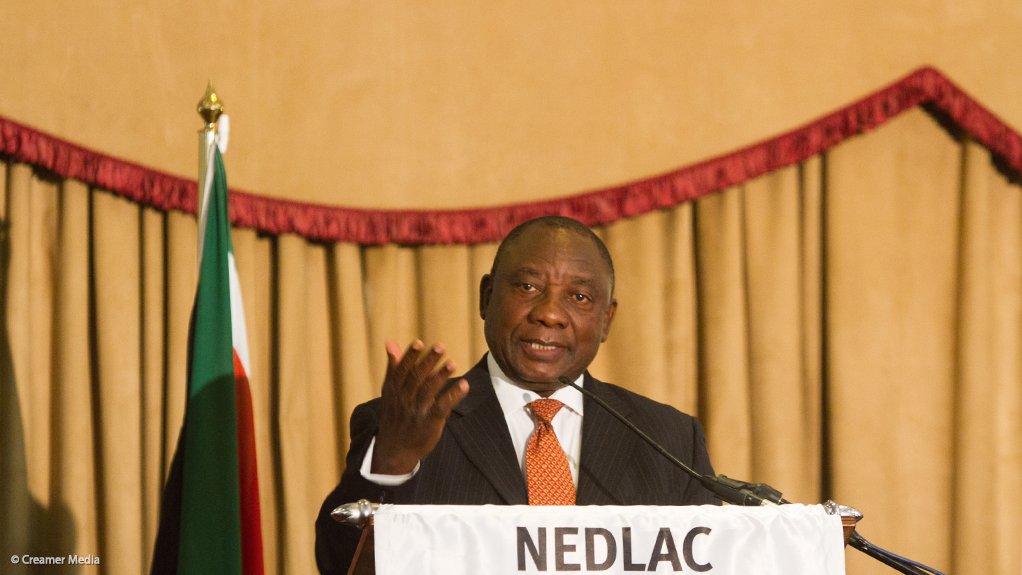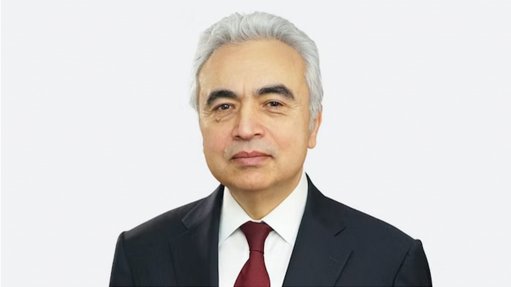Labour market peace plan, minimum wage roadmap endorsed at Indaba
Deputy President Cyril Ramaphosa described Tuesday’s Labour Relations Indaba as the first step in a process of negotiating “concrete” solutions to South Africa’s prevailing labour market instability, as well as serious wage inequality.
Following the meeting, hosted under the aegis of the National Economic Development and Labour Council (Nedlac), government, business and labour representatives endorsed a joint declaration outlining a roadmap for resolving the problems.
In his address, Ramaphosa acknowledged that the challenges outlined in the roadmap did not represent the sum total of issues undermining labour relations, which, in turn, were depressing economic growth and investor confidence. But both were “urgent and critical”, and if effectively addressed, would “expand the capacity of our economy and improve the livelihoods of millions of our people”.
Sharing a platform with the Congress of South African Trade Unions general secretary Zwelinzima Vavi, the Black Business Council’s (BBC’s) Sandile Zungu and Labour Minister Mildred Oliphant, Ramaphosa said the process was unlikely to be “smooth”, owing to differences of opinion on areas that remain unchartered.
But he urged the social partners to draw inspiration from the fact that the indaba had been held in the same Ekurhuleni venue where South Africa’s interim Constitution, which facilitated the transition from apartheid to democracy, had been negotiated in the early 1990s.
“Through social dialogue we have been able to navigate through decades of accumulated hostility and mistrust to forge common solutions,” Ramaphosa said.
“We have it within our means, starting with this Labour Relations Indaba, to transform the labour-relations environment,” he added, while acknowledging that the “social bonds has become frayed” and that there was a risk that the country’s labour relations regime could be “gravely weakened”.
But the differences became apparent almost immediately, with Zungu, who spoke on behalf of the BBC and Business Unity South Africa, warning of the unintended consequences for job creation of instituting a national minimum wage.
Vavi, on the other hand, described such an intervention as necessary and critical, while arguing that there was no evidence internationally to prove that minimum wages led to the destruction of jobs.
“This economy needs a shot in the arm,” Vavi said. “We need more disposable income for those 60% of workers trapped in low-paying jobs and currently earning below the minimum living level calculated to be at R4 500/month for a family of five”.
He noted that only 9% of workers were currently benefitting from sectoral determinations arising from collective bargaining processes and that a national minimum wage should be introduced without delay.
Zungu, however, said that the focus should rather be on employment creation, without which South Africa would have no chance of dealing with its poverty and inequality problems. South Africa’s official unemployment rate remained above 25% on the narrow definition and above 35% once discouraged work seekers were included. The country was also considered to be one of the most unequal globally.
Business accepted and supported the need for minimum wage regulation to protect employees from unscrupulous employers, but “we need to prioritise jobs”, Zungu said. That meant that wages should be responsive to market conditions, while increases should be linked to improved productivity.
“We must [also] return to a more rational labour-relations environment, where management and labour seek to deal with disagreements and disputes on a problem-solving basis,” he said. Business also wanted labour legislation to strike a balance between the promotion of efficiency for employers and the protection of workers.
Zungu warned that the current hostile labour climate, characterised by protracted and sometime violent strikes had become a serious obstacle to growth, development and investment, describing investor sentiment as “dire”. “The events since 2012 have made investors, both local and foreign, more doubtful about the chance of earning a fair return on their investments”.
Vavi said that unions “deplored violence” and had no interest in extending the duration of strikes. Labour was also open to engaging on the issue of violence and was prepared to listen to all voices.
However, the right to strike should be upheld and “gaps” in the law – particularly the law giving employers the “unfettered right” to use replacement labour – should be closed in order to reduce strike-related violence.
Vavi also dismissed calls for compulsory arbitration during protected strikes, arguing that it was “wrong to use just one strike, the platinum strike, as a one-size-fits-all measurement”. The Association of Mineworkers and Construction Union, which was a central protagonist in the platinum strike, was not represented at the indaba.
Outgoing Nedlac executive director Alistair Smith stressed, though, that the indaba was but the first step in crafting a collective response to an issue that had emerged as a national concern.
“The forces and underlying drivers are complex,” Smith warned, but said labour market stability and cooperation was needed to help accelerate economic growth in South Africa.
The National Treasury recently lowered its economic growth forecast to 1.4%, from 2.7% in February. It was also only forecasting growth of 2.5% in 2015, 2.8% in 2016 and 3% in 2017, which was well below the 5% aspiration set out in the National Development Plan.
Comments
Press Office
Announcements
What's On
Subscribe to improve your user experience...
Option 1 (equivalent of R125 a month):
Receive a weekly copy of Creamer Media's Engineering News & Mining Weekly magazine
(print copy for those in South Africa and e-magazine for those outside of South Africa)
Receive daily email newsletters
Access to full search results
Access archive of magazine back copies
Access to Projects in Progress
Access to ONE Research Report of your choice in PDF format
Option 2 (equivalent of R375 a month):
All benefits from Option 1
PLUS
Access to Creamer Media's Research Channel Africa for ALL Research Reports, in PDF format, on various industrial and mining sectors
including Electricity; Water; Energy Transition; Hydrogen; Roads, Rail and Ports; Coal; Gold; Platinum; Battery Metals; etc.
Already a subscriber?
Forgotten your password?
Receive weekly copy of Creamer Media's Engineering News & Mining Weekly magazine (print copy for those in South Africa and e-magazine for those outside of South Africa)
➕
Recieve daily email newsletters
➕
Access to full search results
➕
Access archive of magazine back copies
➕
Access to Projects in Progress
➕
Access to ONE Research Report of your choice in PDF format
RESEARCH CHANNEL AFRICA
R4500 (equivalent of R375 a month)
SUBSCRIBEAll benefits from Option 1
➕
Access to Creamer Media's Research Channel Africa for ALL Research Reports on various industrial and mining sectors, in PDF format, including on:
Electricity
➕
Water
➕
Energy Transition
➕
Hydrogen
➕
Roads, Rail and Ports
➕
Coal
➕
Gold
➕
Platinum
➕
Battery Metals
➕
etc.
Receive all benefits from Option 1 or Option 2 delivered to numerous people at your company
➕
Multiple User names and Passwords for simultaneous log-ins
➕
Intranet integration access to all in your organisation




















